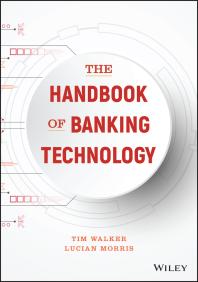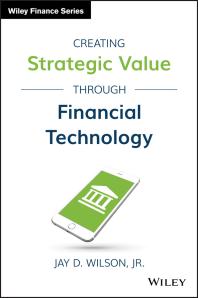 |
Learning Resource Centre Monthly Bulletin |
 |
 |
Learning Resource Centre Monthly Bulletin |
 |
| New Books |
Ebook: FN445 FinTech Future : The Digital DNA of Finance By Sanjay Phadke |  Ebook: FN446 The Handbook of Banking Technology By Tim Walker and Lucian Morris |  Ebook: FN447 Creating Strategic Value Through Financial Technol By Jay D., Jr. Wilson |
| Click Here to learn about the Recent Books added to our collection on different topics of Management. |
| Articles |
| Discovering current trends and forecasting future research directions in FinTech by way of co-word-burst analyses By Carson, Duan Industrial Management & Data Systems; Wembley Vol. 125, Iss. 2, (2025): 458-482. DOI:10.1108/IMDS-03-2023-0190 Abstract :A dataset of 1792 SCI or SSCI articles retrieved from the Web of Science database. First, the paper conducted a scientific production analysis. Then, using bibliometric analysis, the paper conducts co-word-burst analyses for keywords, title, abstract and Keywords Plus to detect the emerging trends. Based on these trends, future research directions were forecasted.The study detected six research themes: the knowledge of FinTech, FinTech applications, FinTech technologies, COVID-19, FinTech ecosystem and FinTech implications for research. These six FinTech research themes were further conceptualized as a six-dimensional analytical framework for FinTech investigations. Then, the study forecasts that these six themes and related conversations will be an ongoing focus of Fintech research, particularly COVID-19 effects on FinTech. | |||
| FinTech, bank risk-taking, and credit allocation By He, Yun; Fan, Wei Humanities & Social Sciences Communications; London Vol. 12, Iss. 1, (Dec 2025): 1670. DOI:10.1057/s41599-025-05931-4 Abstract :Over the past decade, FinTech has emerged as a pivotal catalyst for diversifying the operational landscape of commercial banks and fostering innovation in their revenue streams. However, the influence of FinTech on bank risk profiles and its heterogeneous efficacy across various credit segments warrant closer examination. Utilizing a dataset encompassing 587 commercial banks from 2015 to 2022, this study examines the impact of FinTech on bank risk-taking, with a focus on credit allocation as a key mechanism through which FinTech influences credit risk management. The study reveals three key insights: (1) FinTech augments banks’ proactive risk-taking while simultaneously curbing their exposure to passive risk; (2) FinTech demonstrates notable efficacy in mitigating risks in micro and small credit and retail credit sectors, with less pronounced effects in corporate credit; (3) The risk-preventive impact of FinTech is particularly pronounced in regional banks, albeit with regional differences in its effectiveness. In light of these findings, we propose that commercial banks actively adopt FinTech advancements and expand their application across various credit domains. Banks are encouraged to capitalize on their unique strengths to refine FinTech integration. Furthermore, we advise regulatory bodies to enhance their supervisory capabilities and cultivate regulatory technology to preempt and mitigate potential systemic risks stemming from FinTech advancements. | |||
| Trust and FinTech: A review and research agenda By Devlin, James F; Roy, Sanjit K; Sekhon, Harjit; Moin, S M A; Sahiner, Mehmet. Electronic Markets; Heidelberg Vol. 35, Iss. 1, (Dec 2025): 62. DOI:10.1007/s12525-025-00803-w Abstract :The primary objective of this paper is to formulate a detailed research agenda focussed on trust in the context of FinTech. To achieve this objective, conceptualisations of trust and related constructs are reviewed, and a detailed model of trust is developed. The domain of FinTech is then introduced and is taken to include current and emerging innovations in financial services incorporating aspects of big data and AI, as well as open and decentralised finance and crypto assets. Typologies of FinTech services are also explored. Arguments concerning the importance of trust in financial services are then reviewed, along with prior studies of trust in the context of financial services. Nascent research into trust and FinTech is emerging, but many important questions remain, such as (a) to what degree are traditional definitions and conceptualisations of trust germane to aspects of FinTech and what adaptations or additional factors may be beneficial? (b) from both the trustor’s and trustee’s perspective, what are the relevant objects of dependence that form the focus of the trust relationship in the context of FinTech? (c) are views on the importance of trust consistent across elements of the FinTech domain including big data and AI and open, decentralised, and crypto finance? (d) how best to measure and evaluate levels of trust in FinTech? (e) what are the antecedents and consequences of trust in FinTech and other related questions? Thus, a comprehensive and nuanced exposition of trust and its impact in relation to the gamut of activities encompassed under the FinTech moniker would add significantly to collective understanding. | |||
| Do you wish to explore more articles? Just try using one of the full-text databases below! | |||
| Faculty - Click here to recommend new topics in Finance |
| News |
| PhonePe prepares for billion-dollar India fintech IPO By Asia Tech Review; 27th Jan 2026 |
| AI Becoming More Central and Intuitive to Indian Fintech`s Future, Say Experts By Entrepreneur; 9th Jan 2026 |
Wish to see more News? Click the link below: |